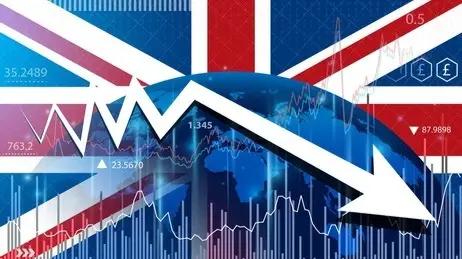Updated 17 April 2024 at 14:42 IST
UK inflation decelerates its descent, delaying expectations for rate cuts
UK inflation eases to 3.2%, dampening BoE rate cut hopes as core and services inflation drop, with food prices up modestly since November 2021.
- Republic Business
- 3 min read

UK Inflation Moderates: Britain's inflation rate slowed less than anticipated in March, suggesting that a potential interest rate cut by the Bank of England might be further away than previously assumed, according to official figures released on Wednesday.
The Office for National Statistics reported a 3.2 per cent annual increase in British consumer prices, down from February's 3.4 per cent rise and marking the lowest rate in two and a half years. However, both the BoE, with its 2 per cent inflation target, and economists surveyed by Reuters had expected a 3.1 per cent increase. This led investors to dial back their predictions for BoE rate cuts, causing the pound to strengthen.
Comparing inflation trends
The deceleration in Britain's inflation rate contrasts with the uptick in headline price growth observed in the United States, where inflation rose for a second consecutive month to 3.5 per cent in March, as per data released last week.
BoE Governor Andrew Bailey, who previously indicated that British inflation was trending favourably for a rate cut, remarked on Tuesday that differing inflation dynamics in the US and Europe could result in disparate paths for interest rates.
Nevertheless, analysts cautioned that Wednesday's data highlighted the ongoing battle against inflation in Britain.
Ruth Gregory, Deputy Chief UK Economist at Capital Economics, warned of the possibility that Britain may replicate the US trend and experience inflation stagnation. "The likelihood of a rate cut for the first time in June has now diminished slightly," she remarked.
Following the publication of the figures, the pound appreciated by approximately half a cent against the dollar and also gained ground against the euro.
BoE rate expectations
While the BoE is still anticipated to implement interest rate cuts later this year, investors scaled back their expectations regarding the magnitude of these cuts. They now fully price in only one quarter-point cut by the end of 2024, potentially occurring as late as November.
Federal Reserve Chair Jerome Powell stated on Tuesday that recent inflation data had not provided US policymakers with the confidence necessary to consider rate cuts imminently.
Detailed data from Wednesday showed that core inflation, excluding energy, food, and tobacco prices, moderated to 4.2 per cent from February's 4.5 per cent, slightly above the Reuters poll forecast of 4.1 per cent.
Service sector inflation, a key indicator of domestic price pressures closely monitored by the BoE, only marginally eased to 6.0 per cent from 6.1 per cent.
The statistics office attributed the decline in headline inflation primarily to a slowdown in food prices, which increased by 4 per cent over the 12 months to March, marking their weakest rise since November 2021.
However, a slowdown in the decline of the headline rate was partially offset by an increase in fuel prices, driven by escalating tensions in the Middle East, causing international oil prices to climb last month.
Steady UK wages
Data released on Tuesday indicated that British wage growth was moderating but remained robust relative to historical standards.
The BoE is wary that rapid wage growth, which constitutes a significant portion of the inflation rate in the services sector, could sustain inflationary pressures across the economy.
"Inflation is receding, but the Bank of England cannot yet be certain that it has been subdued," remarked Ian Stewart, Chief Economist at Deloitte.
(With Reuters Inputs)
Advertisement
Published By : Leechhvee Roy
Published On: 17 April 2024 at 14:42 IST
